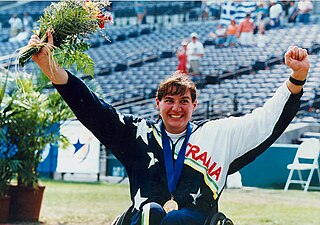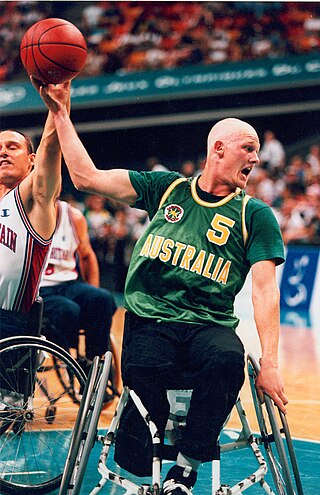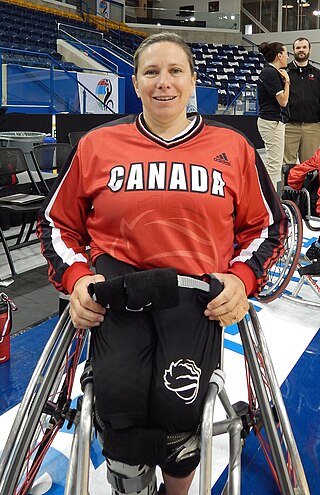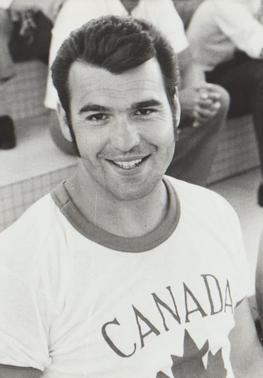Randy Snow was the first Paralympian to be inducted into the U.S. Olympic Hall of Fame and the first paralympian to win medals in three different sports: track, basketball and tennis.

Alix Louise Sauvage, OAM is an Australian paralympic wheelchair racer and leading coach.

Michelle Stilwell is a Canadian athlete and politician. She represented Canada at four Summer Paralympic Games, as well as the 2015 Parapan American Games. She competed in wheelchair basketball before becoming a wheelchair racer, and is the only female Paralympic athlete to win gold medals in two separate summer sport events.

Robert Daniel Steadward, is a Canadian retired sports administrator, professor, sports scientist, and author. Steadward helped organize the first Canadian wheelchair sport national championships in 1968, and later coached Canada in wheelchair basketball at the Summer Paralympics. He became a professor at the University of Alberta in 1971, later served as chairman of the Department of Athletics, and published more than 150 papers about disability sport. He was the founding president of the Alberta Wheelchair Sports Association in 1971, founded the Research and Training Centre for Athletes with Disabilities in 1978, served as president of the Canadian Paralympic Committee from 1984 to 1990, and later became a member of the Canadian Olympic Committee.

The Canadian Paralympic Committee is the private, non-profit organization representing Canadian Paralympic athletes in the International Paralympic Committee (IPC) and the Parapan American Games. It represents 25 member sports organisations.
Francis Ettore Ponta was an Australian Paralympic competitor and coach. He competed in several sports including basketball, pentathlon, swimming and fencing. A paraplegic, he lost the use of both his legs after a tumour was removed from his spinal column when he was a teenager. Ponta was a member of Australia's first national wheelchair basketball team, and is credited with expanding the sport of wheelchair basketball in Western Australia. At the end of his competitive career, he became a coach, working with athletes such as Louise Sauvage, Priya Cooper, Madison de Rozario, Bruce Wallrodt and Bryan Stitfall. He died on 1 June 2011 at the age of 75 after a long illness.

The 1996 Summer Paralympics were held in the United States city of Atlanta. Australia competed in 13 of the 17 sports, winning medals in 10 of those sports. At the 1996 Summer Paralympics, Australia had the second highest medal tally of any country competing. It won 42 gold, 37 silver and 27 bronze medals. It surpassed the 24 gold medals that Australia won at the 1992 Paralympics. The sports of athletics, swimming and cycling provided Australia with the majority of its medals.

Troy Sachs, OAM is an Australian wheelchair basketball player. He competed at five Paralympic Games from 1992 to 2008, where he won three medals. Sachs won two national league championships in Australia, three national league championships in the United States, one national league championship in Germany, and an André Vergauwen Cup championship with Italian club Tabu Cantu.

Gerard "Gerry" Benjamin Hewson, OAM is an Australian former Paralympic wheelchair basketballer. He has coached wheelchair basketball on the national and international level in Australia. Gerry is now studying horticulture at TAFE and is the producer of Gerard Benjamin honey from Cedar Brush Creek.

Tracey Ferguson is a Canadian Paralympic wheelchair basketball player. She has won several gold medals including at three different Paralympic Games.

The Canada women's national wheelchair basketball team is one of Canada's most successful national sporting teams. It is the only national women's wheelchair basketball team to have won three consecutive gold medals at the Paralympic Games in 1992, 1996 and 2000, and the only one to have won four consecutive World Wheelchair Basketball Championships, in 1994, 1998, 2002 and 2006. In 2014 it won a fifth World Championship.
Joey Johnson is a professional Canadian wheelchair basketball player. He has competed in several Paralympics and World Championships and was also the first disabled athlete to be inducted in Manitoba's Basketball Hall of Fame.
Richard "Bear" Peter is a Canadian First Nations wheelchair basketball and para-badminton player. Peter was born in Duncan, British Columbia, and currently resides in Vancouver. When Richard was four years old, he was injured in a bus accident, leaving him in a wheelchair ever since. He began playing wheelchair basketball at the age of 15 when he was inspired by a team that came to his school and introduced him to wheelchair sports. Since then, Peter has competed in the 1996, 2000, 2004, 2008 and 2012 Paralympic Games, winning the gold medal for wheelchair basketball for three of those years.

Eugene "Gene" Reimer was a Canadian wheelchair Paralympic athlete who won 10 Paralympic medals and 50 Canadian and Pan-American medals from 1968 to 1980. Having polio at an early age, he was a member of the wheelchair basketball team Vancouver Cable Cars alongside Terry Fox and Rick Hansen. In 1972, Reimer became the first person with a disability to be named Canada's Outstanding Male Athlete of the Year and to be inducted into the Order of Canada.
Marni Abbott-Peter is a Canadian retired wheelchair basketball player and current head coach of the Canadian senior women's wheelchair basketball team. As a member of Team Canada, she won three gold medals and one bronze during the Paralympic Games as well as four World Championship titles. She was inducted into the Canadian Paralympic Committee Hall of Fame in 2015. She is married to fellow Paralympic athlete Richard Peter.
Jennifer Krempien is a former Canadian wheelchair basketball player. As a member of the Canada women's national wheelchair basketball team, Krempien won four consecutive gold medals at the Wheelchair Basketball World Championship from 1994 to 2006. During this time period, she also won three consecutive Paralympic gold medals from 1992 to 2000. After winning a bronze at the 2004 Summer Paralympics, she did not win a medal at her last Paralympic competition in 2008. Kempien was awarded the Queen Elizabeth II Diamond Jubilee Medal in 2012 and inducted into the Canadian Paralympic Committee Hall of Fame in 2013.
Duncan Campbell, sometimes known as "the Quadfather", is a Canadian co-inventor of murderball. In the 1970s, Campbell invented the sport with four other Canadians before the sport was renamed to wheelchair rugby. In the sport, Campbell coached the Canadian team that went to the 2000 Summer Paralympics and organized the 2010 IWRF World Championship. Apart from wheelchair rugby, Campbell became a recreational therapist for the G. F. Strong Centre in 1986. His honours include an induction into the Canadian Paralympic Committee Hall of Fame in 2005 and receiving the Paralympic Order in 2013.
Kathy Shields is a Canadian basketball coach. She coached the University of Victoria women’s basketball team and the 1984 Summer Olympics as an assistant coach. She is married to Ken Shields.
David "Dave" Durepos is a Canadian retired wheelchair basketball player. He is married to fellow Paralympian Sabrina Pettinicchi. As a member of Team Canada, Durepos competed in five Paralympic Games where he won 3 gold medals along with one silver. On September 25, 2012, the City of Fredericton proclaimed that date to be Dave Durepos Day.
Lawrence "Trooper" Johnson is a former Paralympic coach for the United States women's national wheelchair basketball team and former wheelchair basketball player. He won a bronze medal with Team USA at the 1996 Summer Paralympics and 2000 Summer Paralympics. In December 2021, he resigned as head coach of the women's national team after players alleged emotional misconduct. He said he would cooperate with a United States Center for SafeSport investigation, and believed there would not be any findings.









